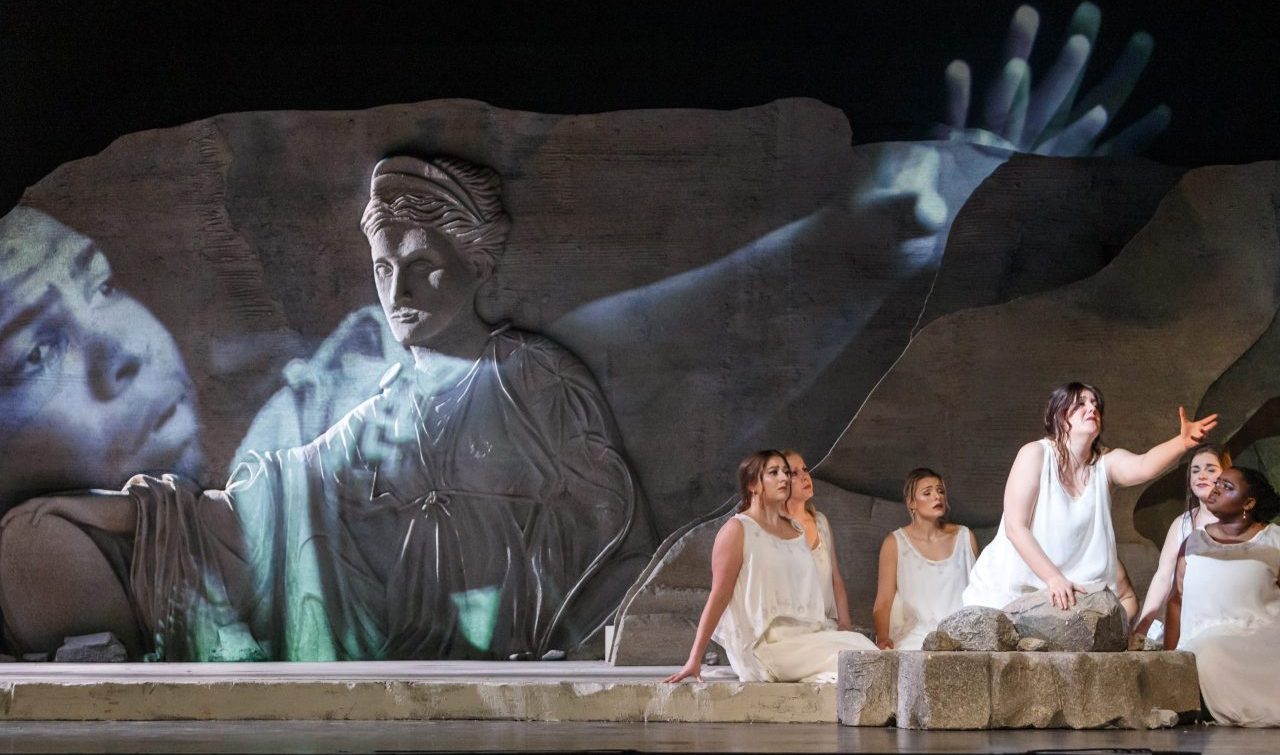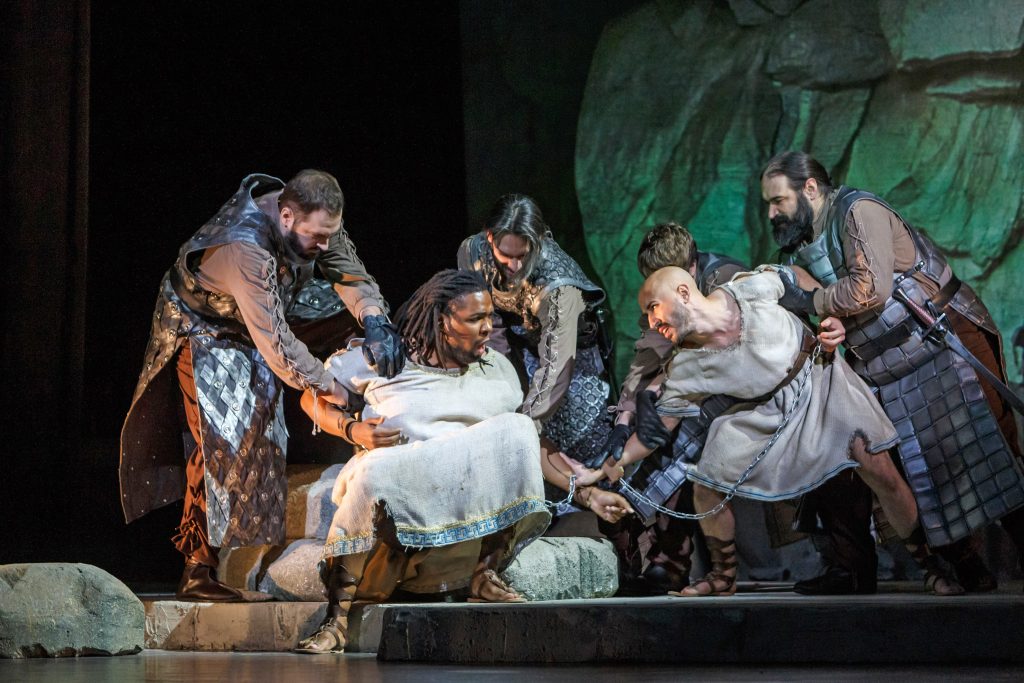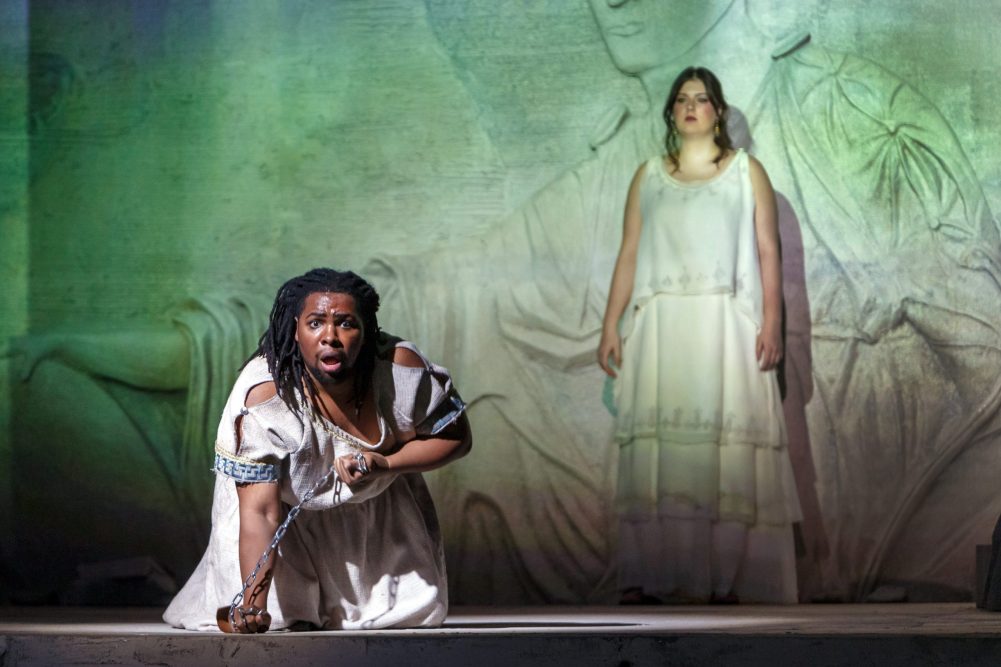Pittsburgh Opera Goes Back to the Future with a Moving “Iphigénie En Tauride”

The conceit of the “what if” story has always fascinated us: what if Ebenezer Scrooge hadn’t been visited by his ghosts in Dickens’ “A Christmas Carol,” or if George Bailey hadn’t had the intervention of the angel Clarence in “It’s a Wonderful Life,” or if Marty McFly hadn’t gone back in time to make sure his mother was kissed by his father at the school dance in “Back to the Future”? We tend to think of these plots as modern inventions, usually grounded in the far-fetched paradigms of science fiction, but actually we can find similar scenarios employed by the ancient Greeks 2,500 years ago.
One engaging example arises from the playwright Euripides, who asked, what if the legendary Iphigenia hadn’t been sacrificed by her father Agamemnon – who was told by the gods that he needed to commit this gruesome act if he hoped to gain favorable winds for his fleet to sail and initiate the Trojan War – and instead, she lived? This is an enticing idea, and in the case of “Iphigénie en Tauride,” (1779) the subject of Pittsburgh Opera’s latest outstanding production.

It’s a simple story with complex undercurrents, as it cuts across several conventions in a seemingly contradictory way. It’s a tragedy that’s not really tragic – the only person to die is a bad guy. And it’s centered on a woman – as 12 of Euripides’ surviving 19 plays are – but it’s also a buddy tale. In addition, there’s no real love interest which, for an 18th-century opera, was revolutionary.
Composed by Christoph Willibald Gluck, with a libretto by Nicolas-François Guillard, the play has additional antecedents in the work of Goethe, as well as other contemporaneous European playwrights. The opera is sung in French with English subtitles projected over the stage.
Director Haley Stamets skillfully manages the frame of the action, never losing touch with the interiority of the characters, especially that of Iphigénie, brilliantly evoked by soprano Emily Richter, and of Oreste, sensitively portrayed by baritone Brandon Bell. Yet the dramatic elements of the production are not sacrificed: Johnmichael Bohach’s set has the pagan flamboyance of Fellini’s film “Satyricon” – imbuing it with the kind of magical-realism that makes the mythic elements believable without drowning them in operatic grandiosity.
This is vital, as the emotion conveyed by Gluck’s score is on an intensely human scale, even though the characters are themselves so godlike. And perhaps this is why the performance is moving: we see the pain these souls are experiencing – being lost, bearing guilt, facing death – not as something ancient and mythic, but immediate and relatable. Furthermore, the “what if” motif – which is inherently redemptive and allows these characters to change their destinies — translates perfectly from a pre- to post-Judeo-Christian moral universe.
Among the highlights of the show are the duets between Iphigénie and Oreste – they do not know they are brother and sister, yet feel a strong attraction (reminiscent of Luke and Leia in “Star Wars”). Lighting and production designer Tláloc López-Watermann enhances the impact of these moments in the second act by infusing the stage with a warm, amber luminescence when they come together, then returning to a stark, white light when Oreste leaves. Also stunning is the lament sung by Iphigénie and her six priestesses. One could feel, sitting in the third row, the pulse of sound issuing from their voices, like sonic ripples of angst manifesting themselves physically.

Anthony Walker conducts the elegant Pittsburgh Opera Orchestra, which brings Gluck’s music to life in a way that makes the two-and-a-half centuries since its composition melt into the present and become a living thing. Laura Reviere’s striking costumes seem to straddle Greek, Roman, and Viking epochs, although I don’t think the anachronism police put opera on their beat these days.
Also exemplary are tenor Fran Daniel Laucerica as Pylade – whose non-slurry enunciation would make your high school French teacher proud, soprano Julia Swan Laird as the ethereal Diana/First Priestess, and bass-baritone Evan Lazdowski as the nefarious King Thoas.
You may be asking yourself the ultimate “what if” — what if I didn’t see this amazing show? Fear not, as you don’t need a miracle of Greek myth or science fiction to send you back in time. Just visit the Pittsburgh Opera website and you’ll find a full season of dramatic performances that can keep you entertained for the rest of the year, and into the future.
FOR FURTHER INFORMATION: www.pittsburghopera.org, or 412-281-0912














